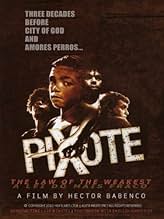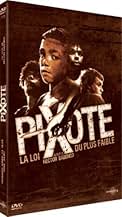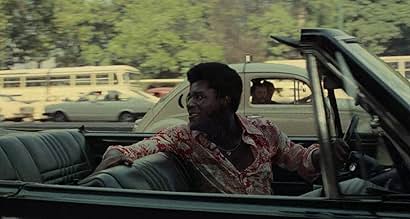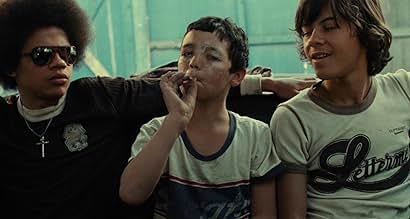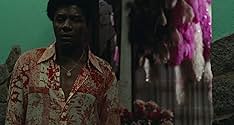IMDb RATING
7.9/10
10K
YOUR RATING
The life of a boy on the streets of Sao Paulo, involved with crimes, prostitution, and drugs.The life of a boy on the streets of Sao Paulo, involved with crimes, prostitution, and drugs.The life of a boy on the streets of Sao Paulo, involved with crimes, prostitution, and drugs.
- Awards
- 10 wins & 4 nominations total
João José Pompeo
- Almir
- (as Joáo José Pompeu)
Rubens Rollo
- Director
- (as Ruben Rollo)
Luis Serra
- Reporter
- (as Luiz Serra)
Featured reviews
When one thinks of the Brazilian cinema it is this film Pixote which comes to mind. Hector Babenco gives us one uncompromising and brutal look at the lives of the street boys in Brazil's largest city Sao Paulo. One only hopes that it is 35 years since Pixote was released and the hope is things have improved for these kids who have to grow up way before their time.
The films centers on the title character played by a young actor who himself never made it out of the slums. Babenco used real street kid Fernando Ramos DaSilva as the ten year old Pixote who was killed at the age of 19 in a homicide that still raises questions. One thing this film does show is that Anglo-Saxon jurisprudence didn't make it to Brazil, especially for the young.
We see things in Pixote that you would never see in American cinema portrayed even now. Rape in a juvenile detention center is the established norm here, especially when it involves Jorge Juliao, a young cross dressing street kid. When the slightly older Gilberto Moura uses sex to assert authority over Juliao it's both frightening and touching. Poor Juliao has one rotten opinion of his own self worth from his experience. One gets the impression that home wasn't all that much better. But these things were being shown way before America even knew there were transgender issues. Juliao even more than DaSilva is who you remember from Pixote.
35 years later Pixote is a powerful and disturbing film.
The films centers on the title character played by a young actor who himself never made it out of the slums. Babenco used real street kid Fernando Ramos DaSilva as the ten year old Pixote who was killed at the age of 19 in a homicide that still raises questions. One thing this film does show is that Anglo-Saxon jurisprudence didn't make it to Brazil, especially for the young.
We see things in Pixote that you would never see in American cinema portrayed even now. Rape in a juvenile detention center is the established norm here, especially when it involves Jorge Juliao, a young cross dressing street kid. When the slightly older Gilberto Moura uses sex to assert authority over Juliao it's both frightening and touching. Poor Juliao has one rotten opinion of his own self worth from his experience. One gets the impression that home wasn't all that much better. But these things were being shown way before America even knew there were transgender issues. Juliao even more than DaSilva is who you remember from Pixote.
35 years later Pixote is a powerful and disturbing film.
10shneur
This is a difficult movie to watch, and would have been even more difficult had I known then that the actor playing the protagonist was in fact killed in his home by police at age 19. Pixote (PeeWee) is a street kid in Sao Paulo who is caught in a roundup triggered by a murder in which he had no involvement. He is committed to a juvenile prison where he witnesses brutality and exploitation that ordinary citizens try very hard to believe doesn't exist. When finally he escapes, he and three comrades survive by the only means they know, which is crime. What makes the film so heart-rending is that both Pixote and the actor portraying him clearly do not wish to be the characters life circumstances have made them. Pixote tries to trust and to love and to bond, but there simply is no room in his world for the gentle side of human nature. One is left at the end wanting desperately to do something for the Pixotes of the world, but what? Building more children's's prisons with higher walls surely is not the answer...
Pixote is probably the most powerful film I have ever seen. An aspect so rarely attained in most films is the gritty reality that Babenco exposes with paramount ability and care. It truly will stay with you forever--you will be touched in such a deep way no matter who you are, no matter where you're from, no matter what movie genre you favor.
Considering that Da Silva's own life was one of the streets, leading to an early death at nineteen, when he was killed by corrupt cops in a drug raid, the film becomes all the more disturbing when we realize that Da Silva truly is Pixote in a circle of life imitating art imitating life.
With no reliable source of aide, these street kids are forced to exist at a most extreme disadvantage. The brutal truth in this film may be difficult to digest, but we can't turn a blind eye. Ultimately, words aren't strong enough to do this film justice, you'll have to experience it yourself.
Considering that Da Silva's own life was one of the streets, leading to an early death at nineteen, when he was killed by corrupt cops in a drug raid, the film becomes all the more disturbing when we realize that Da Silva truly is Pixote in a circle of life imitating art imitating life.
With no reliable source of aide, these street kids are forced to exist at a most extreme disadvantage. The brutal truth in this film may be difficult to digest, but we can't turn a blind eye. Ultimately, words aren't strong enough to do this film justice, you'll have to experience it yourself.
"Pixote: A Lei do Mais Fraco" deals with what is perhaps the greatest of all Brazilian themes: poverty. And along with poverty the other unnatural feelings and actions it brings; prostitution, violence, crime, rape and murder.
Brazil is the country of paradoxes, and its social problems are present everywhere. The difference between the rich and the poor; the beautiful and the ugly; happiness and the most profound human decay.
"Pixote" is one of the films that dare to touch and open these so painful wounds, and does it without the slightest glimmer of hope, in an honest portrayal of a country that, like Pixote himself, is already lost.
Brazil is the country of paradoxes, and its social problems are present everywhere. The difference between the rich and the poor; the beautiful and the ugly; happiness and the most profound human decay.
"Pixote" is one of the films that dare to touch and open these so painful wounds, and does it without the slightest glimmer of hope, in an honest portrayal of a country that, like Pixote himself, is already lost.
Amazing, controversial, and painful are some essential adjectives to allocate this important piece of art, that depicts the searing and factual adolescence of the marginalized children; i.e. victims of our global village.
Pixote prepubescent, with the unflinching stare of the innocent-all-knowing, left an impression of raw truth in finding credence to the old African saying, "It takes a village to raise a child". The awful reality, though, that director Hector Babenco visualized is that Brazil, with it's confusing, twisted, and socio-economic disparity, is the cause of this robbed innocence. In desperation, we see these children in search of nurturing and love, but only permitted leftovers of what society has tossed aside. Institutionalized rape, prostitution, drug dealing, and murder are the only voice they have in order to be nurtured, be loved, and have power. The only thing that Brazil has to offer these lost children are predators; repeating the cycle of hopelessness. Brazil, as a nation is an unworthy parent.
In retrospect, I believe the film "Pixote" is a parable on the world governments turning a blind eye to the hunger pains of the destitute and impoverished victims of an ever-expanding economy; and the force of irresponsible globalization is leaving blood soaked tear trails of destruction through the interconnected avenues of the world. We see through the symbolism of a child that the inequality or disparity in society has a snowball effect causing cannibalism within ourselves.
Pixote prepubescent, with the unflinching stare of the innocent-all-knowing, left an impression of raw truth in finding credence to the old African saying, "It takes a village to raise a child". The awful reality, though, that director Hector Babenco visualized is that Brazil, with it's confusing, twisted, and socio-economic disparity, is the cause of this robbed innocence. In desperation, we see these children in search of nurturing and love, but only permitted leftovers of what society has tossed aside. Institutionalized rape, prostitution, drug dealing, and murder are the only voice they have in order to be nurtured, be loved, and have power. The only thing that Brazil has to offer these lost children are predators; repeating the cycle of hopelessness. Brazil, as a nation is an unworthy parent.
In retrospect, I believe the film "Pixote" is a parable on the world governments turning a blind eye to the hunger pains of the destitute and impoverished victims of an ever-expanding economy; and the force of irresponsible globalization is leaving blood soaked tear trails of destruction through the interconnected avenues of the world. We see through the symbolism of a child that the inequality or disparity in society has a snowball effect causing cannibalism within ourselves.
Did you know
- TriviaThe film's star, Fernando Ramos da Silva, who plays a young street criminal, actually was a street criminal before he made this film. After completing it, he took up the criminal life again, and was killed in Brazil in 1987 in an alleged shootout with police. While police reports claim that da Silva was resisting arrest, there are conflicting reports from eyewitnesses, who claim da Silva was unarmed. Furthermore, a forensic examination showed that he had been shot while lying on the ground. Both his wife and mother called the shooting "a police execution." The story of Fernando Ramos da Silva is depicted in the biographical film Quem Matou Pixote? (1996).
- Alternate versionsAll UK versions were cut by 27 secs under the 1978 Protection of Children Act. The scene removed was a panning shot showing Pixote on a bed alongside a couple having sex.
- ConnectionsFeatured in Sneak Previews: Pixote, Ragtime, Buddy Buddy, Absence of Malice (1981)
- SoundtracksCould It Be Magic
- How long is Pixote?Powered by Alexa
Details
Contribute to this page
Suggest an edit or add missing content


